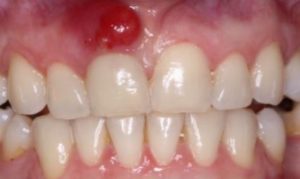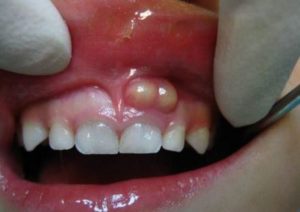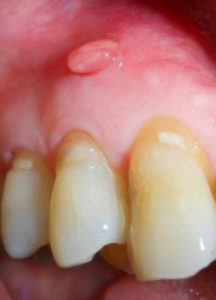A boil on gum also called abscess can be painful and discomforting for both an adult and a child. Gum disease are the most common cause of gum boil during pregnancy. Read through as we provide you with the causes, symptoms, pictures and home remedies on how to treat and get rid of boil on gum.
The most common cause of gum boil is found to be bacterial infection. As you feed, food remains may get trapped in the teeth spaces and beneath the gum. Continues accumulation if this particles provide a breeding ground for bacteria and other small microorganism. Thus it becomes possible for you gum to get infected. Poor dental hygiene is thus the main cause of gum boils.

Other possible causes include oral cancer affecting the gum and mouth lining, gum diseases and excessive smoking. To prevent this condition, you need to brush your teeth after meals. Make sure you use antibacterial toothpaste. Visit a dentist once in a while for routine dental care.
Related articles:
1.How to get rid of boils under armpit
2. Boils on inner thigh and buttocks
Gum Boils Meaning- What Are They?
Gum boil is painful and itchy fluid filled bump appearing on the gum. A boil on gum appears as a swelling or an inflammation. The bump may be itchy and painful when touched. Most boils are filled with pus, blood or dead cells. A boil may start as a small peas sized lump then grow into a big one as the fluid continue to accumulate.
When you have a boil on gum, chewing becomes a problem and if the cause of the bump is serious, you may end up losing your teeth. The cause may range from serious condition such as oral cancer to manageable cause such as poor oral hygiene. Please see medical attention if you notice a boil in your gum that fails to go away after one week.
What Are The Symptoms Of Gum Boils?
The symptom associated with gum boils vary from person to person. They also depend on the underlying cause. The common symptoms associated with boils on gums will however include the following:
- Painful and swollen gum
- Foul teste
- High fever
- Difficulties in swallowing especially in children
- It may be difficult to chew or open the mouth
- Your teeth become sensitive
- Gums become red and swollen
- Tender or bleeding gums
- Your teeth may weaken and you will start losing them
The early you visit a dentist, the better your chance are of preventing the infection from spreading to other parts of the mouth. Gargling your mouth with sea salt can help relieve the mouth of the inflammation as you work to treat the condition.
Pictures, Images of Gum Boils
We have provided the images below to help you diagnose the condition for easy treatment. Take NOTE the diagnosis provided cannot be substituted for that of a professional dentist.


Gum Boils Causes
A boil on gum can be caused by a number of different condition. Below we have provided a list of possible cause, the symptoms and treatment options. We have also provides possible things you can do to prevent the given infection.
1. Tooth decay causing gum boil
A common cause of gum boil is tooth decay. It occurs when acid is produced from plaque that build up in the teeth. It is common for a boil to develop just above an infected tooth. Dead nerve cells in the gum are responsible for bacterial over growth. Common symptoms will include sores in gum, swelling, redness and severe pain in gum.
The best way to treat a tooth decay is a root canal treatment. However, filling or crown can be used to treat early stages of tooth decay. To prevent tooth decay:
- Make regular visit to a dentist
- You need to cut down on your sugar intake. Also avoid starchy foods and drinks
- You should cut smoking and alcohol consumption
- Brush your teeth regularly after meals
- Drink plenty of water
- Exercise regularly
- Eat fresh fruits and vegetables.
2. Gum diseases
The other possible cause of gum boils are gum disease. A common gum disease is pregnancy gingivitis common among pregnant women. The condition is caused by hormonal changes that take place during the early stages of pregnancy.
Common symptom for this condition include swollen gums, tender bleeding gums, weakened teeth, sensitive teeth and pain when chewing and swallowing food. Other contributing factor for the condition are diabetes and excessive smoking.
Mild cases of the condition can be prevented and treated by taking a substantive amount of vitamin A and C, this is by eating fresh fruits and vegetables. A sea salt gargle twice a day can also help kill the bacteria and micro-organism causing this infection.
3. Bacterial infection- gum abscess
A gum abscess also known as periodontal abscess refers to an infection in the space between tooth and gum. The infection occurs when food gets stuck between the gums.
Most cases of dental abscess reported the following symptoms:
- Fluid filled boils on gums
- Pain when chewing and biting food
- Feeling of generally well
- Moving your jaws or opening the mouth become very painful
- Bad breath
- Difficulties in swallowing foods and drink
- High fever especially to children
- Sensitive teeth
- Same people will report cases insomnia
Maintaining high oral hygiene is the first step in keeping both your gums and teeth strong and healthy.
4. Gum boil oral cancer
Oral cancer on gum is most common cause of itchy blood filled lump among people who smoke and drink excessively. The condition is serious and can be indicated by the presence of painless lump on gum. A cancerous cell may start to spread to other part of the body if urgent medical attention is not taken.
According to the National Institute of Dental and Craniofacial Research, the common symptoms associated with oral cancer include the following:
- Sore, irritating and thick patch in mouth along the mucous lining, palate, gums and inner cheek
- Colored patches in mouth
- Difficulties in chewing and swallowing especially in children
- Difficult in tongue mobility
- Pain in one without hearing loss
- Numbness in tongue and inner cheek
- Swollen jaws
If you notice any of the symptoms listed above you need to seek immediate medical attention.
5. Weak immune system and gum boil
Our body’s immune system plays an important part in protecting us from infection. Those with weak immune system are at the highest risk of getting bacterial and fungal infection. It is more common for them to develop oral disease including gum boils. People with weak immune system include:
- Those with HIV/AIDS
- Those taking cancer medication
- Those with sickle cell anemia
- And those on steroids.
Certain aspect of lifestyle change and change of diet can help boost the immune system. This will be important in strengthening the body defense against infection. You can:
- Reduce or quit smoking and taking alcohol
- Exercise regularly
- Drink plenty of water to keep your body dehydrated
- Eat lot of fresh fruits, vegetables and grain
- Cut down on sugar and junk foods.
6. Gum recession
Receding gums or gingival recession refers to the progressive loss of gum tissue. This can eventually result tooth root exposure when left untreated. The condition if more common in old people. The condition can however start in teenage years.
The condition is asymptomatic in early stage. This makes it very difficult to diagnose the condition at home. You need to have regular checkups to the dentist to prevent the condition from worsening. The common cause of gum recession identified by dentist include the following:
- Poor oral hygiene
- Overaggressive brushing
- Chewing tobacco
- Periodontal disease caused by poor oral hygiene or systemic disease such as diabetes.
Treating gum boils caused by gum recession can be done in different ways. For instance, if the cause of the gum recession is overly aggressive brushing techniques, then softer toothbrush and a gentler brushing should be used. When the problems is poor oral hygiene, then professional dental cleaning can be prescribed to keep your teeth clean and free from debris and bacterial.
Root scaling and planning can be used in cases of sever calculus build up. This will help to heal the gingival inflammation and keep the teeth clean.
7. Gum boil poor dental hygiene
Poor dental hygiene is the most common cause of dental and oral disease. After meals most of the food debris accumulate in teeth spaces and along the gum. This provide a good breeding ground for bacteria which cause tooth decay and gum recession. Gum boils is a common symptom among people who fail to regularly brush and maintain oral hygiene.
You need to brush your teeth regularly after meals. Eat foods rich in calcium, vitamin A and C to keep your teeth and gum stronger. Cut down on alcohol consumption and smoking. Finally you need to have regular checkups with a dentist to avoid oral disease that might go unnoticed.
Gum Boils During Pregnancy- What Does It Mean?
Pregnancy gingivitis or gum disease is the most common cause of gum boil during pregnancy. Gingivitis refers to the inflammation of the gums common during pregnancy. It is caused by hormonal changes which cause increase of blood flow to the gums tissue. The gums becomes more sensitive, irritable and swollen.
Swollen gums may be sore and more prone to bleeding. Smoking and diabetics is a common cause of this condition among males. During pregnancy, ensure you have routine dental check up with your dentist. You dentist will diagnose the condition and prescribe medication that will safeguard the health of both you and your unborn baby.
Ensure you follow good oral hygiene to prevent or reduce oral complication. You can also increase the intake of vitamin A and vitamin C either in pure form from fruits and vegetables or food supplements. You can also rinse you mouth with sea salt water to make sure no bacteria accumulate in your gum.
Gum Boil in Child or Toddler
In children and toddles gum boils are cause gum abscess and tooth cavity. Periodontal abscess develop in the chills periodontium- the structure that support both the tooth and the gums. This is what most causes gum boils or gum balls. A common symptom with abscess is when the child finds it hard to chew on the side of the mouth with the boil.
When the boil grows bigger it may rupture when it ripen. When this happens, it is possible for white or yellow fluid to flood the mouth. While the boils may spread to other parts of the mouth, it rarely threats to block the air passage of a child. Gum abscess is prone to complication, please consult a pediatrician as soon as possible.
Other possible causes of abscess in children include the following;
- Tooth cavity that extents into the gums
- Poor dietary habits’
- Weak immune system
- Trauma and mouth injury
- Having aggressive orthodontic treatment can also cause abscess
Common symptoms of oral abscess in children include the following:
- Inflammation of the gum
- Bumps on gum filled with pus
- Oral swelling (tongue, tonsil and gum)
- Sensitivity or pain when chewing
- Red swollen gums
- Bad breath and bitter taste in mouth
- Loss of appetite and weight
- Swollen jaws both upper and lower
- Unwanted teeth loss
- Your child may experience high fever and chills
- Swollen lymph node behind ears
To treat and relieve the mouth of the pain caused by the boils, you can gargle with tea tree oil. This will help to disinfect the inflammation. For rupture boils, genitally brush your teeth with hydrogen peroxide or with baking soda. To subdue the pain, you can also apply a warm compress on the inflamed area of your mouth.
Preventing abscess in children
- schedule regular appointments with the doctor
- make sure your kid brushes his teeth after meals
- flossing is important in keeping your kid healthy
- avoid sugary drinks, sweats and sodas
Gum Boil Comes and Goes No Pain
Have you had a gum boil that recur or has become an on-off thing? This is a possible indication of an underlying infection. You need to have your dentist check it up immediately. Failure to do so opens you up to even more serious future dental problems.
A recurring boil is most common after a root canal. What this means is, the root canal was either not done properly, or an Infection has cropped into you gum. When you have an infection in your gums, your mouth may produce bad breath which can be embarrassing and a big blow to your self-esteem.
Mild cases of tooth and gum infection can be treated with antibiotics. It is however, very fundamental you visit a dentist for early and effective diagnosis. Depending on how spread the infection is, your dentist may perfume surgical procedure to root out the infection. This is common in cases of gum cancer.
Treatment for Gum Boils –How to Treat
Treating a gum boils will involve treating the underlying cause of the boils and managing the symptoms. Treatment also involve preventing recurring of the boils in the future. The swelling, inflammation and pain can all be treated by some of the following options.
1. Antibiotics
Used to help fight bacterial infection in the mouth and more specifically in the gums. The anti-biotic can be inform of gel, cream, pills or injection. For effective treatment let the dentist diagnose the condition and prescribe the medication.
2. Root canal therapy
For those with cases of tooth decay, completely removing the infected tooth is important for treatment. You dentist will fill the remaining space to prevent bacteria from accumulating.
3. Draining the boils
A dentist may also use syringe to drain the boil. This should only be done by professional using clean and sterilized equipment. Draining the boil can be painful and opens the gum to possible fungal and bacterial infection.
4. Surgery
Large boils can also be surgical removed. This will help keep your gums healthy and your teeth out of possible damage.
5. Periodontal therapy
For children with periodontal disease, your dentist will advise deep cleaning to remove active bacterial from the mouth and between the teeth.
6. Vitamin c
Eating more fruits will also help fight the bacteria that build up in gums. Vitamin c is also important in combating gingivitis. Pregnant women and children should try as much as possible to at least eat a fresh fruit a day.
7. Vitamin A
To help your teeth and bone grow strong you need to increase your intake of vitamin A. This can be obtain from food such as sweet potatoes, carrots, fish, liver and topical fruits.
8. Flossing and regularly brushing teeth.
This is the best way to remove tooth decay and help maintain optimal oral health. Use a toothbrush with soft braces that fells comfortable and is not irritating the gum. Brush your teeth regularly for optimal results.
9. Hyrogen peroxide
Treament can also be done with a mixture of hydrogen peroxide with water. This is a very effective home remedy to help cure tooth abscess and inflammations. Here’s to make a hydrogen peroxide mouth wash.
what to do at home
- mix equal portions of hydrogen peroxide with water
- swill it in around the gum and mouth for upto 1 minute
- Spit it out
- Do this twice daily for best results until healing occurs
Home Remedies to Cure, Get Rid Of Gum Boils
Apart from the treatment describe above, gum boils can be treated at home using natural home remedies. The swelling and inflammation of the gum can be treated by the following:
- Rinse and gargle your mouth with salty water
- To also reduce the inflammation on gum, you can apply a turmeric paste on the boils. Hold the paste for 20 minute then rinse it off with warm gargle.
- Another natural bacterial killer is garlic juice, when applied twice a day for a week, the juice will be able to reduce the inflammation and swelling caused by boils on gum.
- You can also rinse you mouth with saline water to help reduce pain and itching
- To get rid of the gum boil infection you can also use a mixture of table salt and baking soda. Mix them in equal measures and apply the mixture on the boils on gums. Repeat for optimal results.
Sources and references
- Gum bois: http://www.healthyhowto.org/boils/gum-boil/gum-boil-causes-pictures-symptom-causes-treatment/
- Gum boils cause: http://healthncare.info/gum-boils-abscess-pictures-symptoms-causes-treatment/
- Gum and oral problems: http://www.medicinenet.com/gum_problems/article.htm
- Oral health: http://www.webmd.com/oral-health/dental-care-pregnancy
- Gum disease treatment: http://americanpregnancy.org/naturally/treat-gum-disease-naturally-pregnancy/
- Gum abscess children: http://www.tandurust.com/childrenshealth/gum-abscess-children-causes.html
- Dental problems children: http://www.dentaltownsmiles.com/7-warning-signs-your-child-has-a-dental-infection/
- Dental abscess: http://www.medicalnewstoday.com/articles/170136.php
- Tooth decay and gum boils: http://www.nhs.uk/conditions/Dental-decay/Pages/Introduction.aspx
- Dental gingival: http://www.beaverdentist.com/procedures/gum-recession/

Thank you so much for the information. I have just applied turmeric paste after salt water rinsing & can feel the inflammation subsiding. Spent a sleepless night trying to figure out what to do.